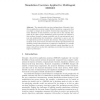Free Online Productivity Tools
i2Speak
i2Symbol
i2OCR
iTex2Img
iWeb2Print
iWeb2Shot
i2Type
iPdf2Split
iPdf2Merge
i2Bopomofo
i2Arabic
i2Style
i2Image
i2PDF
iLatex2Rtf
Sci2ools
112
click to vote
ICCS
2004
Springer
2004
Springer
Simulation Coercion Applied to Multiagent DDDAS
Abstract. The unpredictable run-time configurations of dynamic, datadriven application systems require flexible simulation components that can adapt to changes in the number of interacting components, the syntactic definition of their interfaces, and their role in the semantic definition of the entire system. Simulation coercion provides one solution to this problem through a human-controlled mix of semi-automated analysis and optimization that transforms a simulation to meet a new set of requirements posed by dynamic data streams. This paper presents an example of one such coercion tool that uses off-line experimentation and similarity-based lookup functions to transform a simulation to a reusable abstract form that extends a static feedback control algorithm to a dynamic, data-driven version that capitalizes on extended run-time data to improve performance.
ICCS 2004 | Simulation Coercion | Unpredictable Run-time Configurations | flexible Simulation Components |
| Added | 01 Jul 2010 |
| Updated | 01 Jul 2010 |
| Type | Conference |
| Year | 2004 |
| Where | ICCS |
| Authors | Yannick Loitière, David C. Brogan, Paul F. Reynolds Jr. |
Comments (0)

